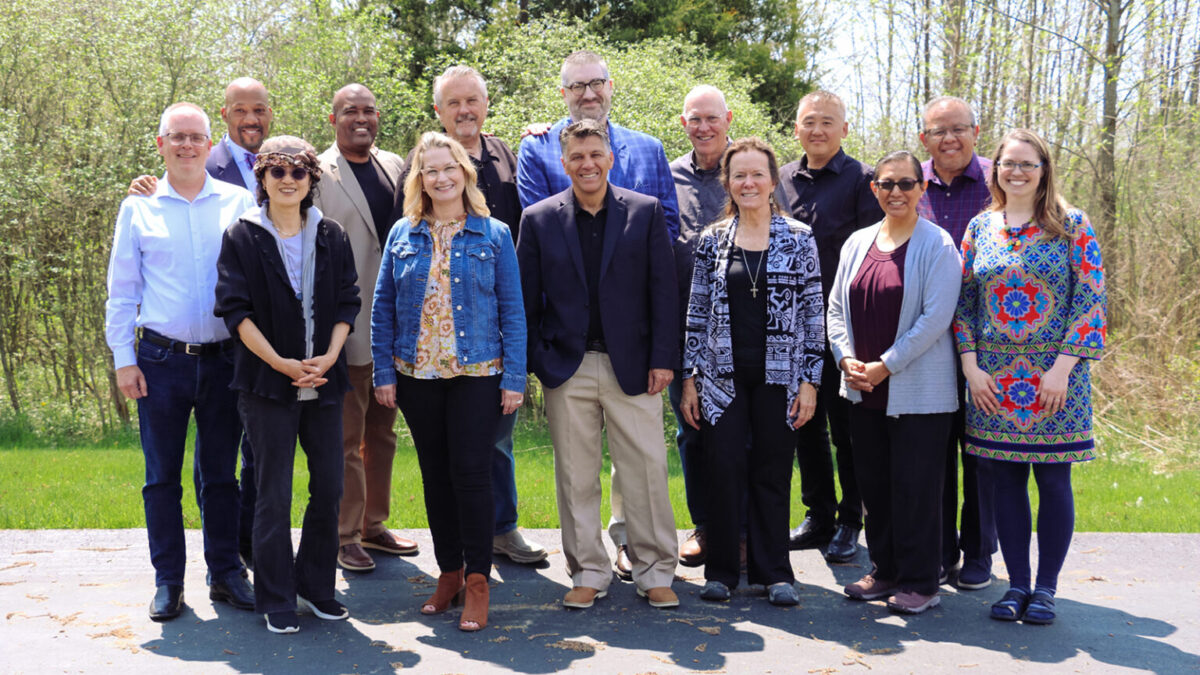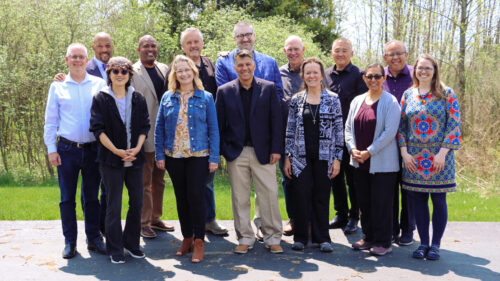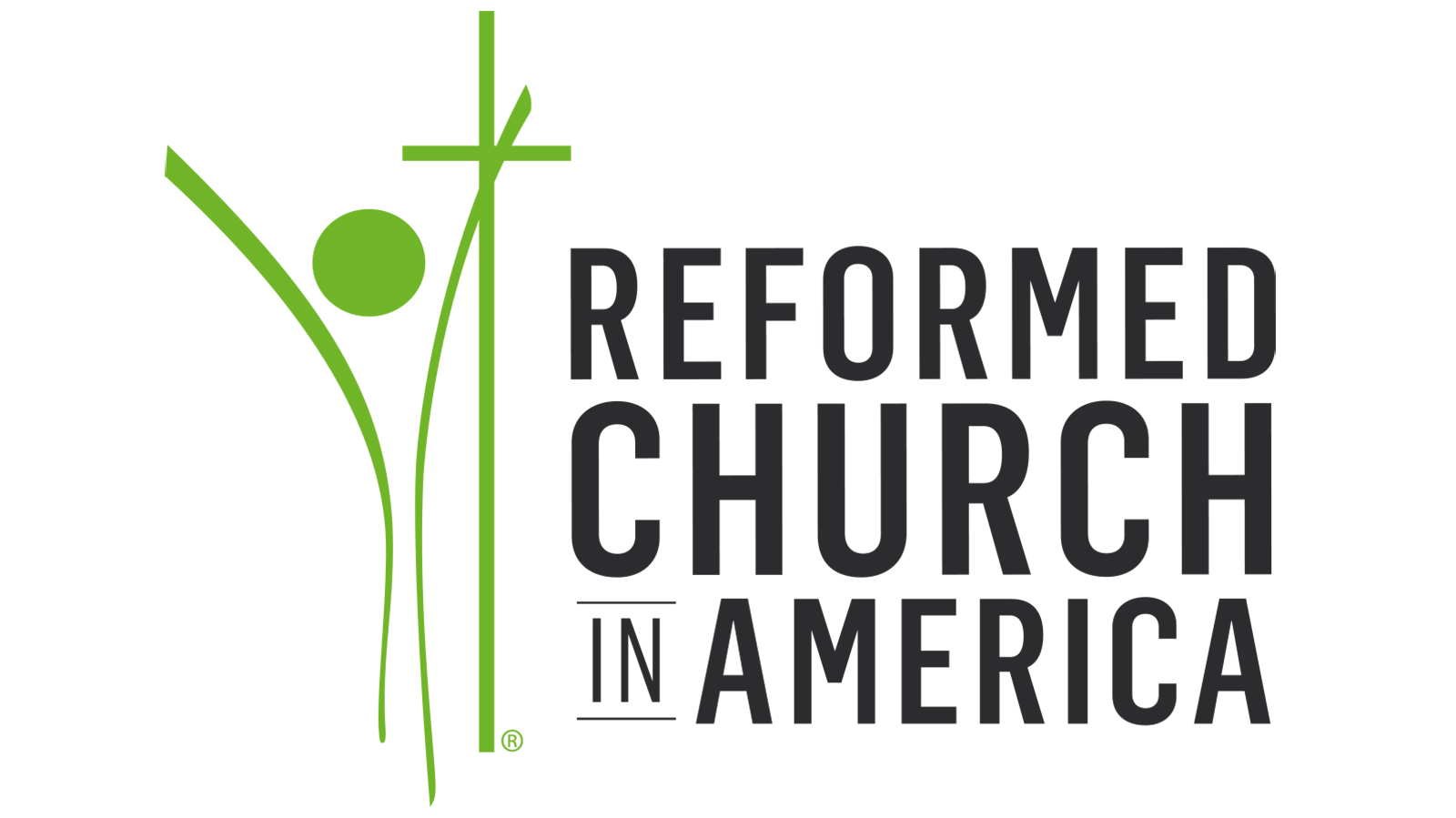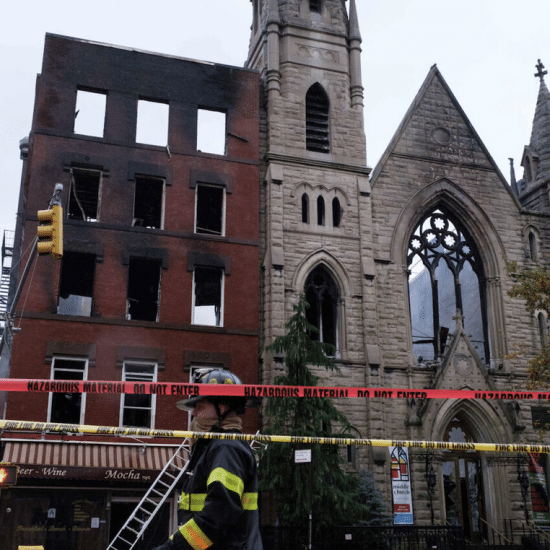
(RNS) — In the past five years, the Reformed Church in America, one of the oldest denominations in the U.S., has lost almost half its membership and nearly a quarter of its churches. Some members see in the collapse an opportunity to reinvent the 400-year-old church, founded by Dutch settlers in the mid-1600s.

The Reformed Church in America restructuring team in Grand Rapids, Michigan, in May 2022. (Photo courtesy of RCA)
“There’s a potential to form a new cloth,” said Michelle Chahine, an RCA elder from Lansing, Michigan, who is one of 13 national and regional leaders preparing to present recommendations for the restructuring of the RCA at the denomination’s General Synod beginning Thursday (June 13). “The cloth is no longer Dutch immigrant. The cloth is woven with texture and color, and the texture is the cultures, the things that we can learn from.”
If passed, the 10 proposals, which aim to concentrate finances and staffing resources at the local church level, streamline governing models, reduce overhead costs, and update how denominational decisions are made, could, church leaders argue, chart a path toward renewal.
“We need to be brave enough to step out in faith and believe God is bringing people to us for that very reason, to grow in our ministry,” said Chahine.
Fewer than 700 congregations remain in the RCA as long-standing theological differences regarding same-sex marriage and the ordination of LGBTQ clergy have accelerated a decline in attendance that has affected nearly every Christian group in recent years. Attempting to move past the gridlock over LGBTQ issues, the General Synod in October 2021 affirmed that local jurisdictions, called classes, could continue to make their own decisions. The synod also created an off-ramp for churches that wanted to leave the denomination.
Many conservative RCA congregations had already done so, and the off-ramp streamlined the process for joining splinter groups or other denominations altogether. Since December 2019, nearly 250 churches have left or have begun the process of leaving. Individuals have also chosen to exit: More than three-quarters of RCA churches today report average attendance of fewer than 100 people on Sundays, resulting in financial challenges at all levels of the denomination.

The Reformed Church in America logo. (Courtesy image)
If there’s good news, it’s that the RCA is also growing in some places as it diversifies. Christina Tazelaar, chief operating officer of the RCA, said the denomination’s two newest classes are made up largely of Latino churches and leaders. One of them, a Texas classis that started with three churches in December, is expected to have 23 by the end of next week.
To get a handle on these changes, a restructuring team was appointed in 2022. After a year of spiritual discernment, the team introduced draft recommendations at General Synod last June and released three subsequent drafts in response to feedback from thousands of people across the denomination.
“It coalesced into a labor of love,” said Chahine, a member of the restructuring team. “It took over that first year for people to trust us. But when we acknowledged that we needed to rework things, people started to trust us more.”
Perhaps the most ambitious proposal envisions removing a level of governance by combining regional synods with classes to reduce bureaucracy and redundancy. If approved, these hybrid groups would be called “middle assemblies.” While the restructuring team anticipates that most middle assemblies would be organized by geography, churches could opt to join ones based on theological convictions or other traits.
“It’s not just a reshuffling or just a renaming, it’s a mission opportunity. It allows a middle assembly or classis to identify who they are, become clear about what their context is, shape themselves around that context, strengthen it,” said Chahine.
Other proposals are aimed at ensuring proportional representation of church groups at General Synod and paving the way for more equitable decision-making and leadership. One asks General Synod to experiment with consensus decision-making, rather than Roberts Rules of Order; another asks the Pastoral Formation Oversight Board to develop guidelines for welcoming ministerial candidates with credentials from outside the U.S. and Canada.

Eddy Alemán. (Photo courtesy of RCA)
“Our system right now for ordination is for white, North American leaders,” Eddy Alemán, general secretary of the RCA and a member of the restructuring team, told Religion News Service. “But we have people from Zambia, Zimbabwe, from El Salvador, from Argentina, and to go through all these steps, how do we process this faster to allow them to become part of the RCA?”
Cost saving is another focus of the recommendations. A proposal to reduce in-person General Synod meetings to every three years, with virtual meetings in the interim, could save the RCA more than $1 million over three years, according to the restructuring team’s report.
Thanks to the RCA’s consensus polity, any changes to the denomination will be gradual. If passed, some of the proposals, including the creation of middle assemblies, would then require approval by two-thirds of classes, followed by ratification at the next General Synod. Other proposals, such as the frequency of in-person General Synods, would be referred to smaller groups that would propose specific amendments to the RCA’s bylaws.
For many churches, finances have as much to do with whether they will stay as theology. The Rev. Beth Carroll, senior pastor of a church in Oakland, California, said she’s encouraged by the restructuring team’s emphasis on redistributing resources from the national to local level. But she said her past attempts at securing financial support from higher levels of the RCA, including General Synod, haven’t been fruitful.
“I love the RCA. I really do. It’s the denomination of my childhood. Theologically, I find myself in a lot of alignment,” said Carroll. “I don’t want to leave, but I don’t know if I can afford to stay.”
Others, such as Alemán, said they are looking to the proposals before the RCA to usher in a new church culture, one focused on empowering local congregations and uniting them in a common call to advance the gospel of Christ.
The Rev. Wes Granberg-Michaelson, general secretary emeritus of the RCA, agreed that the major disruptions of the last few years could be turned into a moment of transformation.
“The RCA has to figure out, if now, having been through the trauma it’s experienced, and having really dealt with the pain that comes from the kind of division and loss and really battle that we’ve experienced, can the denomination make that pivot to now turn itself outward,” he said, “and ask again, what is the common mission that we can draw ourselves to?”

